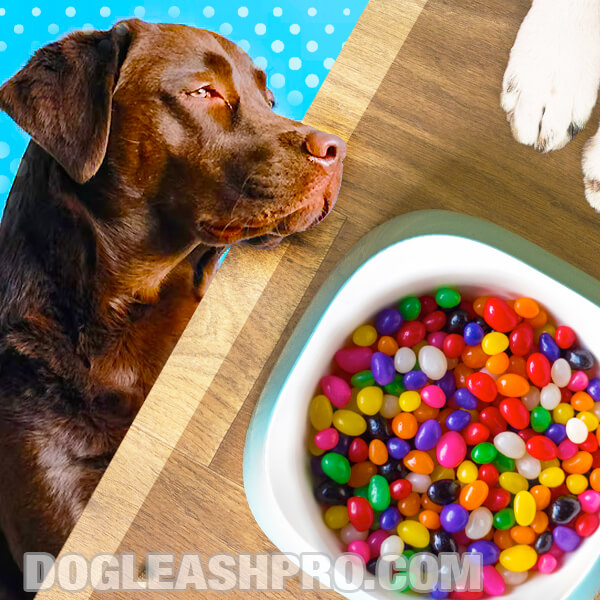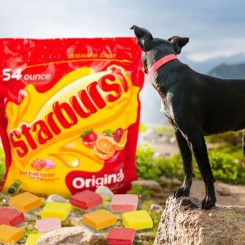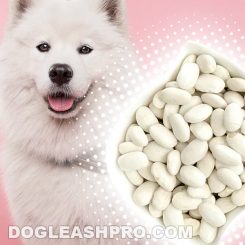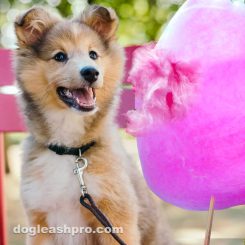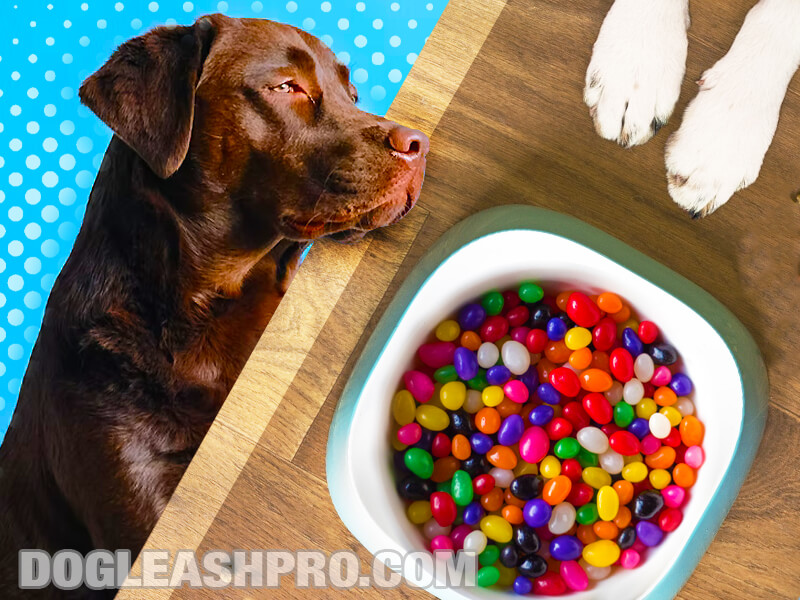
Can dogs eat Jelly Beans? No, dogs should not eat Jelly Beans. While candies are neither toxic nor poisonous to dogs, they are considered sugar and too much sugar consumption will have negative effects on your dog’s health. In fact, some Jelly Beans may even contain caffeine, xylitol, and pectin which are all harmful to dogs. Avoid feeding your dog Jelly Beans.
Jelly Beans are a popular, fun, and colorful candy. They look harmless, but are they safe for canine consumption? If you’re enjoying some Jelly Beans, can you share it with your dogs? Here’s the quick answer first before we explain how Jelly Beans can affect your dog’s overall health.
In this article, we’ll discuss everything you need to know about Jelly Beans and dogs. Let’s get started!
Table of Contents
Can dogs have Jelly Beans?

No, dogs should not have Jelly Beans. Jelly Beans are made with ingredients that are harmful and unhealthy to dogs such as sugar, pectin, caffeine, and even xylitol. While sugar isn’t toxic to dogs, eating too much sugar regularly can have negative long-term effects on your dog’s health.
For instance, when dogs consume too much sugar, they are at risk of diabetes, weight gain, dental disease, heart disease, arthritis, and even pancreatitis.
RECOMMENDED: Can Dogs Eat Jello? Complete Guide to Dogs & Gelatin
Are Jelly Beans bad for dogs?
Yes, Jelly Beans are bad for dogs. Avoid offering Jelly Beans to your pooch at all costs.
In fact, some sugar-free Jelly Beans may contain xylitol, a sugar-free sweetener that is toxic to dogs. Immediately after your canine friends consume xylitol, their blood sugar level drops as well as their blood pressure.
Symptoms of xylitol poisoning include:
- Vomiting
- Lack of coordination.
- Difficulty standing or walking.
- Muscle weakness.
- Lethargy.
- Tremor.
- Seizures (in severe cases).
- Coma (in severe cases).
In addition, Jelly Beans are known to contain preservatives which allow the candy to have a longer shelf life.
Jelly Beans also contain artificial ingredients such as artificial flavors and coloring. It’s not surprising when you find dyes as one of the ingredients in Jelly Beans.
Unfortunately, some dogs are sensitive to these ingredients and may be allergic to them. If you’re not sure whether your furry pals are allergic to these ingredients, we highly recommend that you consult with your dog’s vet.
Before feeding your pooch any human snacks and candy, it’s best to take a look at the ingredients first and find out if they are safe for doggy consumption.
You might also like: Can Dogs Eat Sour Patch Kids?
My dog ate Jelly Beans! What should I do?
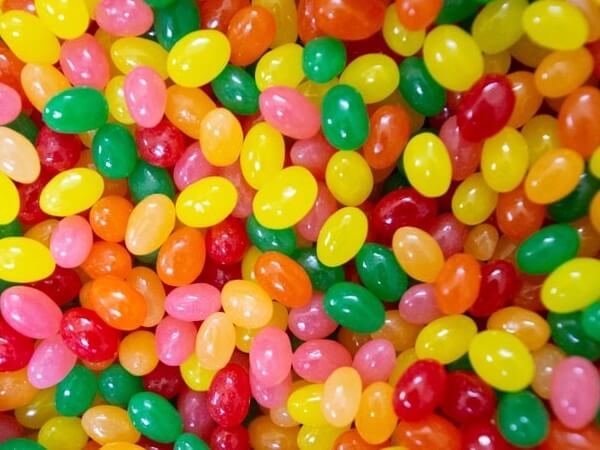
If your dog ate Jelly Beans, here’s what you should do:
- Find out if your dog ate sugar-free Jelly Beans. Some sugar-free Jelly Beans contain xylitol. If it’s the sugar-free Jelly Beans with xylitol as one of the ingredients, call your vet immediately.
- Figure out how many Jelly Beans your dog ate. If your furry friend ate a few Jelly Beans, they should be fine, especially if the candies don’t contain xylitol.
- Observe your pup’s behavior over the next 12 to 24 hours. If you notice any behavioral changes or any negative reactions, contact your vet as soon as possible. Signs of toxicity to look out for include diarrhea, vomiting, tremors, lethargy, and drooling.
Let your vet know right away how many Jelly Beans your dog ate and whether there was xylitol in them. This way, your vet can prepare for your dog’s arrival and treatment properly and timely.
Are Jelly Beans safe for dogs?
No, Jelly Beans are not safe for dogs. Jelly Beans and all candies, in general, are not safe for doggy consumption. Try not to feed your dog any Jelly Beans and dogs should definitely not eat Jelly Beans daily or regularly.
Not only would your dog be at risk of weight gain, diabetes, heart disease, dental issues, and pancreatitis, but they are also at risk of xylitol poisoning.
You may be interested in: Can Dogs Eat Cotton Candy?
Jelly Beans and dogs
There are many different types and brands of Jelly Beans. Below, we’ll cover the most popular Jelly Beans on the market and find out if they are safe for canine consumption.
Can dogs eat black licorice Jelly Beans?
No, dogs should not eat black licorice Jelly Beans. Can dogs eat black Jelly Beans? No, dogs should not eat black Jelly Beans or Jelly Beans of any color.
As we discussed above, all Jelly Beans, including black licorice Jelly Beans and black Jelly Beans are harmful to your dog’s health. The Jelly Beans can get stuck on your dog’s teeth and cause dental issues such as cavities and tooth decay.
Then, there are also the negative effects of sugar consumption on your dog’s overall health. Your pooch may gain weight, have diabetes, a sudden spike in blood sugar level and blood pressure, metabolic changes, heart disease, and even pancreatitis.
Can dogs eat licorice Jelly Beans?
No, dogs should not eat licorice Jelly Beans. Licorice root is toxic and harmful if your four-legged friends eat a lot of licorice Jelly Beans. Avoid feeding your pooch licorice Jelly Beans.
If he or she accidentally ate a whole bag of licorice Jelly Beans, then you’ll want to call your vet right away and let your vet know which type of Jelly Beans your dog ate. Some dogs may start to have increased blood levels and pressure right after eating licorice Jelly Beans.
Can dogs eat starburst Jelly Beans?
No, dogs should not eat starburst Jelly Beans. That’s because starburst Jelly Beans also contains artificial colors and flavors. It’s crucial that dog owners keep all types of Jelly Beans, including starburst Jelly Beans away from their canine friends.
Candies are bad for our dog’s health. If your pooch ate one or two starburst Jelly Beans, they should be fine, but it’s important that you still observe them closely for any negative reactions or changes in behavior.
RELATED: Can Dogs Eat Starburst?
So, can dogs eat Jelly Beans?
As we can see, Jelly Beans are harmful to dogs and we should avoid offering our pooch this candy at all costs.
Jelly Beans also contain ingredients that are not safe for doggy consumption such as artificial flavors and colors.
Watch out for sugar-free Jelly Beans as those may contain a sweetener called xylitol which is extremely toxic to dogs.
DISCLAIMER: THIS WEBSITE DOES NOT PROVIDE MEDICAL ADVICE
The information, including but not limited to, text, graphics, images and other material contained on this website are for informational purposes only. No material on this site is intended to be a substitute for professional veterinary advice, diagnosis, or treatment. Always seek the advice of your veterinarian or other qualified health care provider with any questions you may have regarding dietary needs.
Resources:
https://en.wikipedia.org/wiki/Jelly_bean
https://www.merckvetmanual.com/toxicology/food-hazards/xylitol-toxicosis-in-dogs

With over five years of specialized experience as an animal writer, my expertise lies in dog nutrition, health, behavior, grooming, and training. I am dedicated to delivering helpful and informative content that caters to the well-being of our furry friends. My primary goal is to empower pet owners with knowledge and ensure our canine companions thrive in health and happiness. In my free time, I love volunteering at local dog rescue centers.
